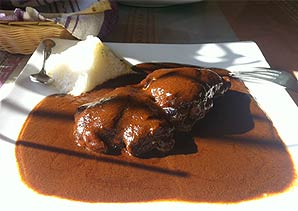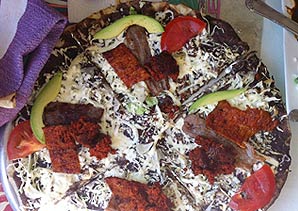
RESTAURANT REVIEW: Case Oaxaca.
Hole-in-a-wall highlights indigenous cuisine that’s not your typical Tex-Mex fare.
Everyone knows their mom’s cooking is the best. But when madre is not in the casa, Head Chef Rogelio Martinez comes close.
When you walk into Casa Oaxaca’s stain crafted walls you feel as though you’ve walked into your neighbor’s house for dinner ̶ in Mexico. With tropical curtains, small mythical statues, and walls adorned by murals, the ambiance is warm and inviting. Waitresses wearing white dresses embroidered with flowers and full of smiles and prompt attention confirms it: like any hospitable host, they make it known that they want you to stay.

Oaxaca is known for their pre-Hispanic food and is known as Mexico’s culinary capital. Their style involves using hot to medium spicy chilies to help cook the traditional seven types of moles that evolved from their state. Simmering red and yellow mole sauces have chilies, but Head Chef Rogelio Martinez’s favorite dish is the mole negro for $10.
Infused with chocolate and 32 spices, flares of pasilla and guajillo chilies give a sweet smokiness to the dark brown mole sauce, integrated in enchiladas, tamales and chicken and rice dishes.
“It’s so popular, we have to cook gallons of the sauce daily,” said Martinez, who also owns the restaurant with wife Angelica.
Martinez draws his influence from Zapotec cooking.
Before the Conquistadores arrived and brought domesticated livestock to the Americas, the indigenous people of the Valley of Oaxaca subsisted on a diet of tubers, squash, corn, and nuts and chilies. He incorporates this rustic cuisine with hints of vibrant to mild spices, fermenting their flavors through a roasted or boiled process.
Indulge in their twists on traditional Mexican drinks, where horchata is unlike your favorite taqueria’s version. For one, it’s pink and infused with melon and speckled with walnuts. The chilacayote looks gross and swampy but the strings of squash add a pleasant surprise. It also packs the sugar rush of 13 pan dulces.
Martinez plays with more exotic ingredients. Try his version of nopales, a somewhat sour cactus salad, mixed with onions and tomatoes.
If you’re really adventurous, get your mouth on the tlayuda. This large tortilla is first layered with black beans, fresh and string cheese like quesillo and cabbage, then topped with thinly sliced pieces of juicy beef, tasajo, spicy Oaxacan sausage and tomato and avocado slices. The bold Oaxacan sausage enhances its mild flavors.
Vegetarians need not be left out. Rajas de chile pasillas con crema, a side of chopped roasted peppers and corn in cream will make you wipe your plate clean with your tortilla.
Martinez intends to keep the essence of his Zapotec culture, traveling to and from Mexico to source ingredients and find inspirations for his restaurant, while searching for authentic fare that inspires his modernist take on an ancient culinary tradition.
“Giving the world a taste and history of Oaxacan gastronomy is something you’ll experience only here,” Martinez said.
3317 W 1st St Santa Ana, CA 92703
(714) 554-0905

- The two-party system is failing us. - October 19, 2024
- Read our Fall 2023 Print: Vol. 100 No. 1 - October 23, 2023
- Santa Ana College Awarded State Department of Finance Grant - April 2, 2015











